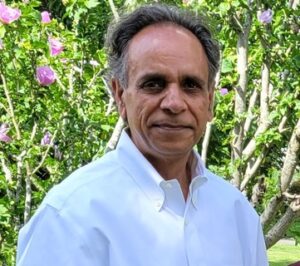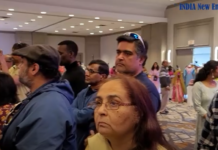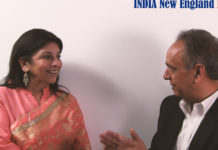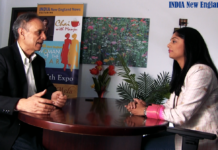By Upendra Mishra
BOSTON—If we compress the essence of life in one word, it probably comes down to: Freedom. Freedom to do things we want to do, freedom to love, freedom to travel, freedom to live or die, freedom to buy, freedom to be powerful, wealthy, ascetic, successful or whatever you wish—if it is within the reins of the fundamental law of nature.

So, the question is how to be free and what can guarantee it? The short answer is: not even the most powerful position in the world, or the status of maximum wealth or power can guarantee freedom—and if it does, it is probably very short-lived.
In this context, I remember an Indian mythological story of King Janak and sage Ashtavakra. Janaka is the most revered king who rules his kingdom efficiently. He himself is an awakened human being, enjoys all the luxuries and pleasures of life, and still he remains unattached to everything as if he possesses nothing. He has the most powerful army of the time and brilliant advisors. Still, he struggles with some key issues of life, including a robust feeling of freedom. Despite being bestowed with everything in life, he does not feel free.
It is worth nothing that King Janaka was already known as the most detached person; he was the most powerful king of the time, and he had freedom, resources and power to do anything he wanted to do. But still he wanted to know “how to find detachment, wisdom and freedom?” We can own the whole the world and still may not be free and that is why emphasis on freedom is so important here. How to be free?
One day King Janka runs into one of the top sages of his time: Ashtavakra. Ashtavakra literally means someone whose eight limbs are bent or handicap. Ashtavakra has an in-depth understanding of the Self and summarized the Advait (nondual) philosophy beautifully in a small text called Ashtavakra Gita. Ashtavakra is simple, bold, clear and to the point. He teaches that once you go beyond fear and doubt, you instantly transform yourself. He bluntly makes us aware of awareness: “Yesterday I lived bewildered, in illusion. But now I am awake, flawless, and serene, beyond the world.”
The dialogue between King Janak and Ashtavakra is compiled in a book called Ashtavakra Gita, also known as Ashtavakra Samhita. If you are interested, I recommend a translation of Ashtavakra Gita by Thomas Byrom: The Heart of Awareness (93 pages, 1990, Shambhala Dragon Editions.)
One day King Janaka sits down with the young Vedic sage Ashtavakra, and asks: “O Master, tell me how to find detachment, wisdom and freedom?”
Ashtavakra starts with freedom first. He says:
“Child,
If you wish to be free.
Shun the poison of the senses.
Seek the nectar of truth,
Of love and forgiveness,
Simplicity and happiness.”
Ashtavakra always teaches to bring oneself to the Self and most importantly to the awareness of the Self and the fact that the Self is different from your body and even your mind. He says:
“Earth, fire and water,
The wind and the sky—
You are none of these.
If you wish to be free,
Know you are the Self,
The witness of all these,
The heart of awareness.”
And then he advises to set oneself aside from the body:
“Set your body aside.
Sit in your own awareness.
You will at once be happy,
Forever still.
Forever free…
Right or wrong,
Joy and sorrow,
These are of the mind only.
They are not yours.
It is not really you
Who acts or enjoys.
You are everywhere,
Forever free.”
While this dialogue between King Janak and Ashtavakra is going on in India, probably at the same time (a few hundred years before or after) another philosopher in Greece is pondering over the question of freedom. He is Epictetus.
Epictetus (born 50 AD – died 135 AD) was born into slavery at Hierapolis, Phrygia (present-day Pamukkale, in western Turkey) and lived in Rome until his banishment, when he went to Nicopolis in northwestern Greece for the rest of his life, according to Wikipedia.
What is Epictetus thinking about freedom?
“If someone tried to take control of your body and make you a slave, you would fight for freedom,” says Epictetus. “Yet how easily you handover your mind to anyone who insults you. When you dwell on their words and let them dominate your thought, you make them your master.”
Fast forward to the 20th century. Mahatma Gandhi echoes similar sentiments: “I will not let anyone walk through my mind with their dirty feet.”
Michael Singer, the author of the New York Times bestseller “The Untethered Soul: The Journey Beyond Yourself” has a very different take on freedom.
“You will never be free, however, until you get to the point where you are willing to release the initial pain instead of avoiding it. You must learn to transcend the tendency to avoid pain,” says Mr. Singer. He adds: “If you want to be free, you must first accept that there is pain in your heart. You have stored it there. And you have done everything you can think of to keep it there, deep inside, so that you never have to feel it…The moment you are not afraid of the pain, you’ll be able to face all of life’s situations without fear.”
That is not easy, however. We must use our own experiences of life and carve out our own path to freedom.
“Freedom is not worth having if it does not include the freedom to make mistakes,” adds Gandhi.
And about freedom and we being ourselves? J. Krishnamurthy has answered this beautifully: “We all want to be famous people, and the moment we want to be something we are no longer free.”
(Mr. Mishra is managing partner of the Waltham, MA-based integrated inbound marketing and PR firm The Mishra Group. He writes about his three passions: marketing, scriptures, and gardening.)














